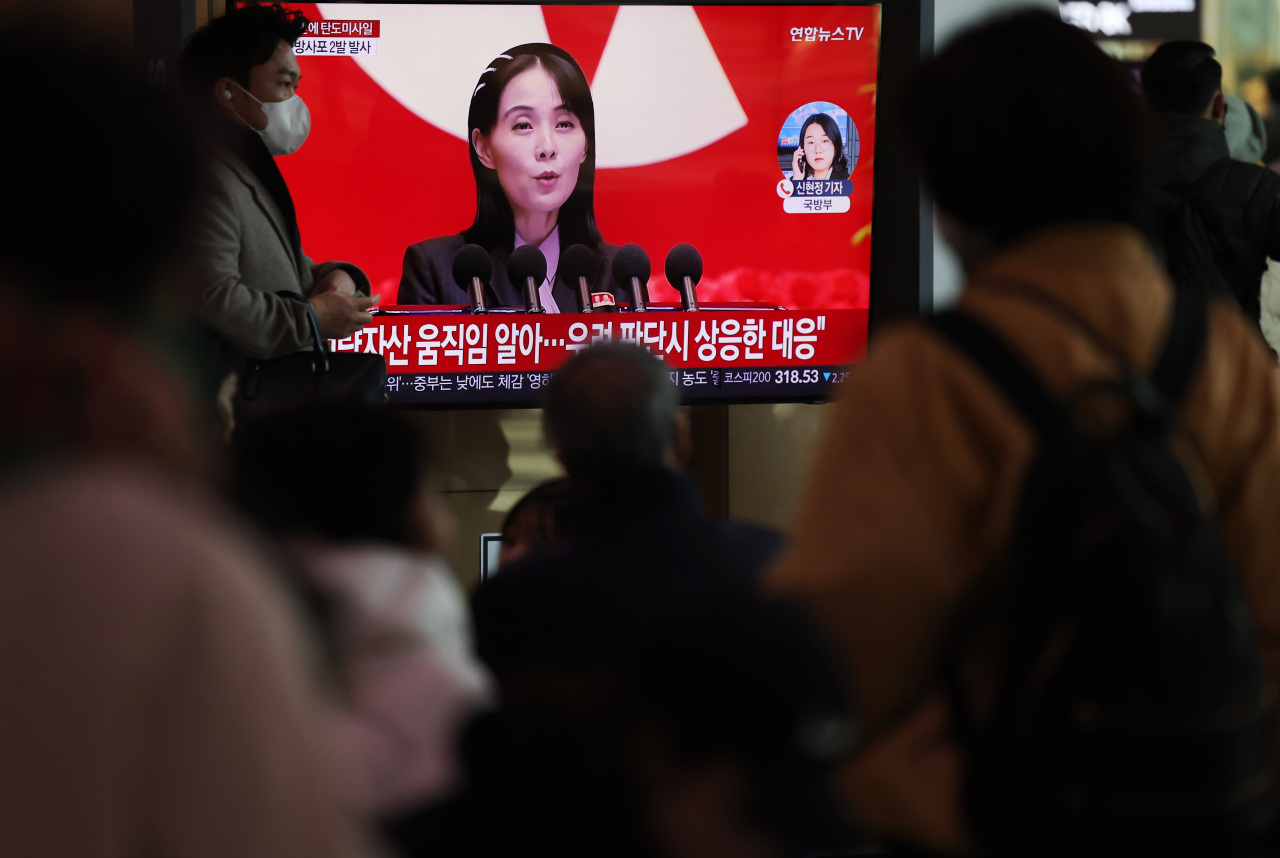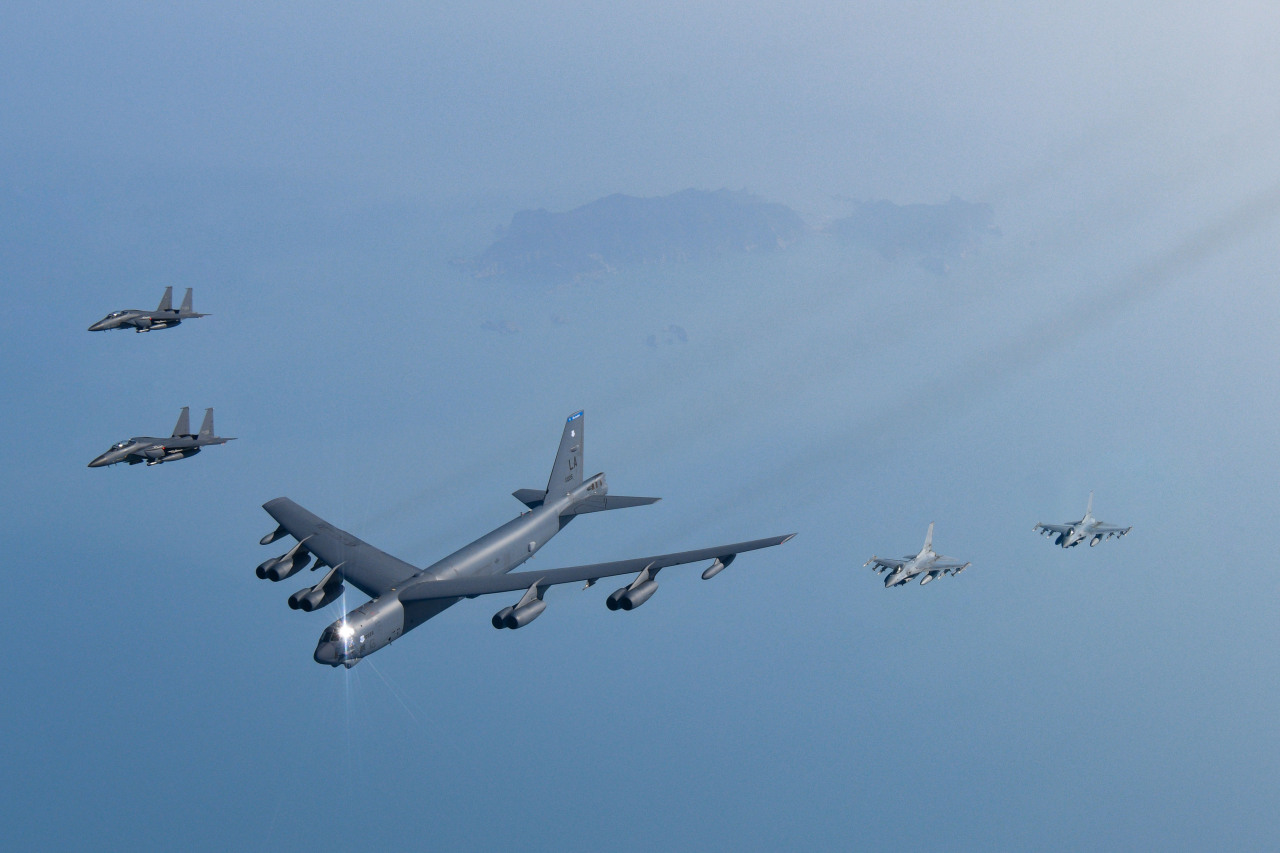 |
Passersby watch a news report on North Korean missile launches on Feb. 20 at Seoul Station in Seoul. (Yonhap) |
North Korea’s continuing war of words shows its intent to lay the foundation for taking likely high-profile military action during the upcoming “Freedom Shield” exercise, Seoul-based experts said. But at the same time, the verbal threat with the absence of action shows cash-strapped North Korea’s struggle to respond to each of the more frequent deployment of US strategic assets in South Korea and accompanying military drills between the allies.
Kim Yo-jong, North Korean leader Kim Jong-un’s powerful sister and mouthpiece, urged South Korea and the US to “refrain from making remarks and behaviors that further aggravate the situation” in a Korean-language statement.
“As already clarified, we are keeping an eye on all active military moves by the US forces and South Korean puppet military and maintain a constant readiness posture to take appropriate, swift and overwhelming actions at any time according to our judgment,” Kim said.
Kim’s statement was issued in response to remarks by the commander of the US Indo-Pacific Command Adm. John Aquilino.
South Korea’s Chosun Ilbo newspaper on Monday exclusively reported that Adm. Aquilino said the “US will immediately intercept it if North Korea fires an intercontinental ballistic missile toward the Pacific region” during his meeting with South Korean Consul-General in Honolulu Hong Seok-in on Feb. 24, citing unnamed military sources. The commander also reportedly denounced Kim Yo-jong’s previous warning of turning the Pacific into a “firing range.”
In return, Kim said “neither the US nor Japan has territorial sovereignty of the Pacific Ocean.”
“If the US takes military action in response to our test of strategic weapons conducted without causing any harm to the safety of neighboring countries in international waters and airspace which is not subject to the US jurisdiction, it will undoubtedly be regarded as a clear declaration of war against the Democratic People’s Republic of Korea,” Kim said in the statement, referring to North Korea by its official name.
ICBM launch at normal angle
Seoul-based experts said North Korea seeks to forewarn that it could potentially launch an ICBM toward the Pacific at a normal angle.
“North Korea continues to harness Kim Yo-jong’s statements as a means to justify its ICBM launch at a normal angle as its tit-for-tat action to combined military exercises between South Korea and the US,” said Yang Moo-jin, a professor at the University of North Korean Studies.
Yang said Kim Yo-jong’s statement also aimed to “send a warning message” that North Korea has plans to take tit-for-tat military actions should the US seek to intercept a North Korean missile fired at a normal angle.
The pronouncement had a changed significance as it came days after vice director of the National Aerospace Development Administration Pak Kyong-su underscored its right to continue space exploration and development in his interview with the state-run Korean Central News Agency.
“Pyongyang intends to justify its launch of rockets and missiles labeling them as peaceful activities while highlighting that outer space and the Pacific Ocean are global commons that anyone can use.”
 |
A U.S. nuclear-capable B-52H strategic bomber (C), alongside F-15K and KF-16 jet fighters of South Korea, fly in formation over the Yellow Sea on March 6, 2023, as the allies staged combined air drills against North Korea`s evolving military threats. (Photo - Defense Minsitry) |
“If the dangerous military provocations of the US and South Korea continue to remain uninterrupted, there will be no guarantee that violent physical conflict will not occur on the Korean Peninsula where vast armed forces of both sides are intensively and sharply confronted,” the Korean-language statement said.
The statement said the “international community should send a clear signal to the US and South Korea to immediately stop war exercises by joining the DPRK’s peace-loving efforts to alleviate tensions on the Korean Peninsula and in the region.”
Hong Min, director of the North Korean Research Division at the South Korean state-funded Korea Institute for National Unification, pointed out that North Korea took a two-pronged approach to sending messages through Kim Yo-jong and the Foreign Ministry.
“Kim Yo-jong’s statement mainly intended to send advance warning of taking military action against the US and South Korea and build legitimacy for the action,” Hong said.
“The Foreign Ministry’s statement aims to highlight the injustice of the US military threats that undermine the regional situation and demand cessation of threats by sending messages targeting the international community.”
For instance, Kim Son-gyong, vice minister for International Organizations of the Foreign Ministry, underscored that the “UN and the international community will have to strongly urge the US and South Korea to immediately halt provocative remarks and behaviors and combined military exercises” in a press statement released on Sunday.
Hong said North Korea’s Foreign Ministry has focused on claiming the “double standard” of the UN and the international community for military actions by North Korea and the allies to make a justification for its military action that is widely expected to be taken during the upcoming South Korea-US military exercises.
Struggle of a cash-strapped NK
Experts also pointed out that the recent spate of statements with the absence of military tit-for-tat actions shows Pyongyang’s struggle to respond to each of the frequent deployments of US strategic assets on the Korean Peninsula and accompanying combined military exercises amid the ongoing economic woes.
Washington has carried out the commitment made in January by US Secretary of Defense Lloyd Austin to step up the deployment of US strategic assets to strengthen US extended deterrence against North Korea.
The US dispatched its B-1B Lancer strategic bomber and nuclear-capable B-52H Stratofortress strategic bomber to South Korea respectively on March 3 and Monday for combined aerial drills with South Korean fighter jets.
Hong explained that North Korea would feel the burden to respond to military exercises that the allies have reinforced since the beginning of the year.
North Korea therefore intends to “selectively respond to South Korea-US combined military exercises and adjust the timing to that end in view of the scale and size of the drills and effectiveness of its tit-for-tat actions” by releasing a series of statements, Hong added.
Hong forecast that North Korea will take action during the annual springtime combined exercise dubbed as “Freedom Shield.” The allies will especially bring back theater-level field training exercises after a five-year hiatus.
“In light of North Korea’s food crisis, financial difficulties and material shortages, it is expected to be challenging to take tit-for-tat action constantly and proportionately,” said Lim Eul-chul, a professor of North Korean studies at Kyungnam University in Seoul, referring to North Korea’s longstanding principle of taking corresponding measures to military actions by South Korea and the US.
“Therefore, there is a high chance that North Korea will opt to demonstrate its nuclear combat strength to guarantee maximum deterrence at minimum cost.”
Lim said North Korea will seek to “take stronger, overwhelming actions in much more unexpected ways to gain the upper hand” over the US and South Korea.







![[Today’s K-pop] Blackpink’s Jennie, Lisa invited to Coachella as solo acts](http://res.heraldm.com/phpwas/restmb_idxmake.php?idx=644&simg=/content/image/2024/11/21/20241121050099_0.jpg)